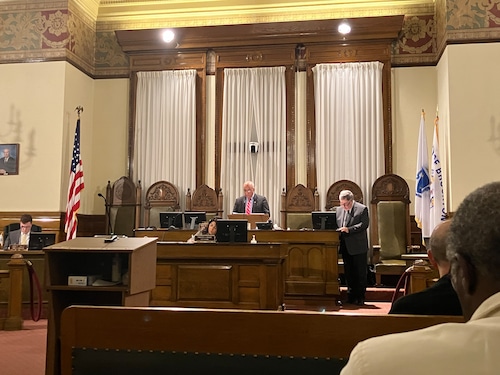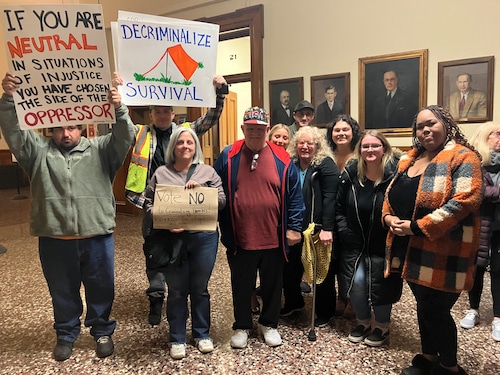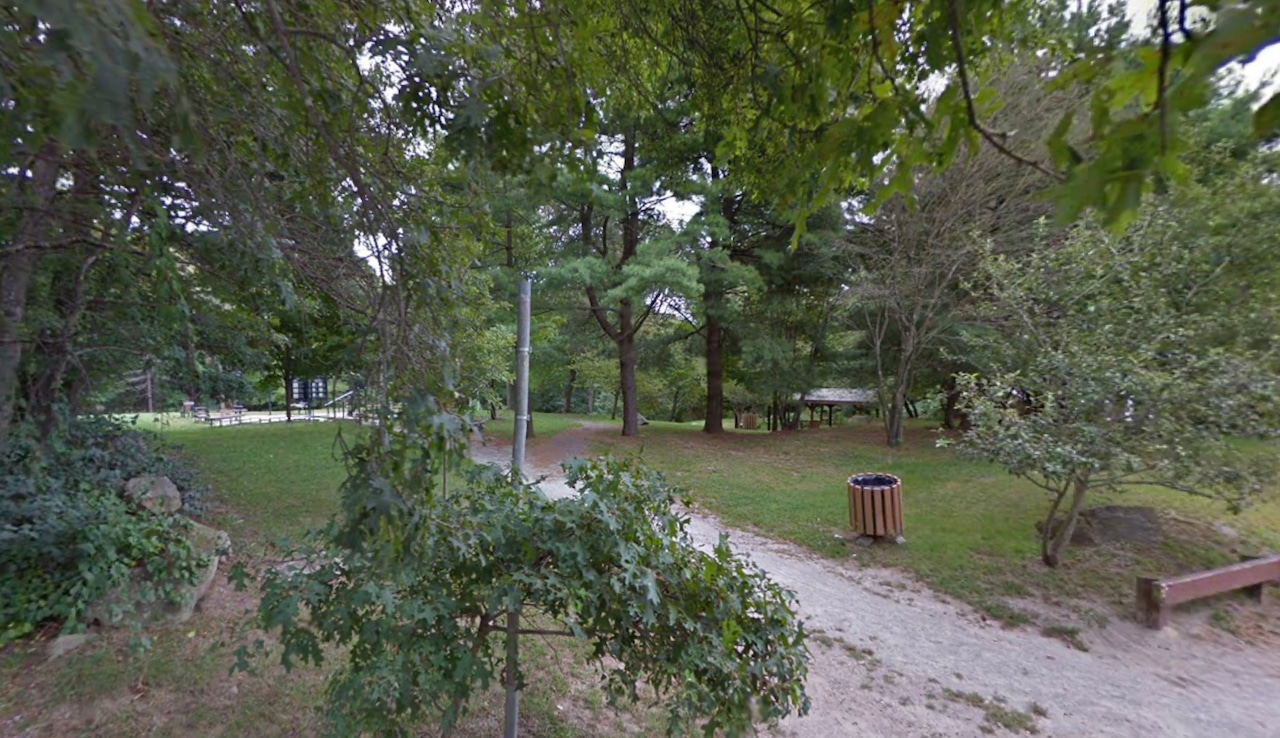Brockton City Council passed a ban on public sleeping and camping with a split vote Tuesday night in an effort to address a growing number of homeless encampments in the city.
The new ordinance makes it illegal to sleep on any public property at any time or to camp in or around any street, sidewalk, park or bridge. Those who violate the law could be forcibly removed from the premises, face hundreds of dollars in fines and be issued a criminal complaint.
During a Brockton City Council meeting Tuesday night, over a dozen protesters — including Brockton state Rep. Michelle DuBois, 10th Plymouth — sat in the audience with signs calling on the council to reject the ordinance.
Despite this, the new law passed by a 7 to 4 vote.
Councilors Jeffrey Thompson, Tom Minichiello Jr., John Lally, Shirley Asack, Philip Griffin, David Teixeira and Moises Rodrigues voted in favor of the ordinance, and Councilors Winthrop Farwell Jr., Jean Bradley Derenoncourt, Maria Tavares and Susan Nicastro voted against it.
Fall River City Council passed a similar ban in September despite criticism that the new ordinance was too punitive, but Brockton’s new law is even more stringent. While Fall River’s ordinance stipulates that the ban cannot be enforced when no shelter space is available, Brockton’s makes no such allowance.
Additionally, violators of Fall River’s new law only face criminal charges if the city enforces an unpaid fine through the court system. Brockton’s ordinance allows the city to seek a criminal complaint if a violator breaks the law more than three times.
Brockton city councilors who supported the new law said it is a necessary — if imperfect — tool that the city can now use to address safety issues caused by homeless encampments.
“It’s not safe for children going to school, it’s not safe for adults going to work. It’s certainly hurting our efforts to grow and improve the City,” Ward 6 Councilor Lally wrote over text on Tuesday.
However, the ordinance’s detractors argue that it will be ineffective and criminalize homelessness.
“I think it’s an embarrassment,” DuBois said after the meeting. “I think that when someone gets arrested and they get brought to jail, I really hope that the ACLU and lawyers that have morals and care about people will stand up for them. If not, we’ll just be filling our prisons with homeless people.”
Why most city councilors support the ordinance
Ward 5 Councilor Thompson explained the different provisions in the ordinance to Brockton City Council’s Ordinance Committee during its Oct. 10 meeting, explaining that it was created with help from many city officials and local law enforcement organizations.
He emphasized that the ordinance deals with two scenarios — one in which a campsite poses an “immediate hazard,” such as blocking a sidewalk, and one in which it doesn’t.
A campsite that poses an immediate hazard may be removed by police or city employees immediately, while a campsite that doesn’t will be subject to a 24-hour removal notice that will be available in multiple languages and contain information about local shelters and other social services.
The city will also post signs near places where people experiencing homelessness often camp, such as under bridges or in the city’s largest park, Thompson said. This is important to ensure that due process rights are respected, according to the city’s legal department.

Brockton City Council President Moises Rodrigues stands at the podium in the city council chamber Tuesday. The council voted 7-4 to approve a new law banning homeless encampments and outdoor sleeping.Susannah Sudborough/MassLive
Thompson argued the new ordinance is easily enforceable. Violators will receive a written warning for their first offense (the 24-hour notice counts as a written warning) and subsequent offenses incur a $200 fine. Each day a person violates the new law counts as a new offense, and after four offenses, the city can seek a criminal complaint.
The new ordinance gives city workers and law enforcement discretion over how to handle individual situations, Thompson said.
“We’ll leave it for now within the discretion of our Brockton Police Department to determine which people are multiple offenders with no regard to our ordinances and those who maybe need a break,” he said.
While some opponents of the law are concerned that it criminalizes homelessness, Thompson and other supporters of the ordinance said the city is looking into creating a “community court” through Brockton District Court that would connect people who are homeless to resources. It’s unclear whether violators would still face a criminal charge under this system, but Thompson has said repeatedly that Brockton’s homeless population will continue to be treated with “compassion and respect.”
“This ordinance, in my opinion — it’s not about going after the homeless,” Ward 1 Councilor Minichiello Jr. said during the council meeting Tuesday night. “ … It’s basically focusing on those individuals and their conduct that infringes on ordinary citizens who are just trying to go about their business.”
During the Tuesday meeting, some councilors even seemed offended by the idea that the ordinance was criminalizing homelessness.
“I serve on boards that feed, house and clothe the homeless population. Do you think I would support an ordinance that would go against everything that I do in my spare time, that my colleagues or friends serve on these boards and commissions?” Ward 7 Councilor Asack asked.
Opposition from frontline workers
Jazmine Bradsher, a social worker who works with the city’s homeless population through the mayor’s office, said during the Ordinance Committee meeting that she is concerned the law does not make an exception when no shelter beds are available in the city.
The city’s shelters are already almost at capacity, Bradsher said, and, for safety reasons, they will have a hard cap of around 200 people come winter. The city’s last count found about 300 residents who were regularly homeless.
“While there are ways, I think, to change this and make it work for the purposes that we need it to, to address the health and safety concerns, I’m still very concerned for the people that are going to be outside, and what options we’re going to be able to provide for them, because we don’t have enough shelter beds,” she said.
Some people who are homeless cannot be admitted to shelters for various reasons, such as having an open criminal case against them, Bradsher said. If the new ordinance is enforced using criminal complaints, it could make it more difficult for the city’s homeless residents to access shelter beds.
“Do you then criminalize a mother for having her children outside because she has nowhere to bring them? Or because they get denied from family shelter because maybe they make $5,000 too much?” she asked.
There are also people who aren’t in a healthy enough mental state to make good choices, Bradsher said.
Contrary to Thompson’s view that allowing for police discretion is a boon, Bradsher said she’s concerned that it could lead to problematic inconsistencies in the issuing of criminal complaints.
“I have had, unfortunately, people that show up for calls for us from the police department that are not on the same page all the time, so we get a different response depending upon who we get,” she said. “ … If we’re going to have that type of standard in the ordinance, it needs to be set for everybody.”
Bradsher recommended reworking the ordinance to allow for leniency with violators in specific circumstances. She also urged the councilors to look into ways the city could provide more overnight shelter beds.
Opposition within Brockton City Council
Councilors who opposed to ordinance fell into two camps. One camp was led by Councilor-at-Large Farwell Jr., who appeared to agree with the spirit of it, but had numerous concerns about the feasibility of enforcing it. He said during the Ordinance Committee meeting that the police department and city do not have the means to handle the removal of so many encampments or the issuing and posting of so many notices.
One of Farwell’s biggest concerns was about how the police and city would track repeat violators and previous offenses. He struggled to imagine how responding police officers or city employees would determine whether a violator had received a prior 24-hour notice, whether they had committed a previous offense, and if they had, how many offenses they had committed.

Over a dozen protesters attended a Brockton City Council meeting on Tuesday to oppose a city ordinance banning public sleeping and camping. State Rep. Michelle DuBois of Brockton, third from the left, opposes the measure.Susannah Sudborough/MassLive
Farwell noted that city workers would not be able to demand identification from violators — assuming they even have an ID. Additionally, only police would be able to determine whether a violator had committed a crime — one condition under which the city would be allowed to remove them without prior notice.
Brockton Police Lt. William Schlieman told Farwell the police department has systems in place to track violators and offenses and that the department is ready and able to enforce the new ordinance. Yet, Farwell seemed unconvinced.
“An ordinance that’s not being used is really a meaningless ordinance,” he said.
The other camp was led by Councilor-at-Large Derenoncourt, who argued during Tuesday’s city council meeting the ordinance will create a new problem of homeless people being jailed because they are unable to pay fines resulting from the law.
It’s unfair to blame homeless people for problems such as residents’ feeling unsafety, Derenoncourt said. People aren’t thinking about all the reasons someone can become homeless and are assuming they’re bad people when in reality, no one is immune to homelessness, he said.
“We have a moral obligation to help those who are not able to help themselves,” he said. “Some of the people on the street — they are doctors, lawyers, moms and dads, brothers and sisters, families, veterans, people who have served this country.”
What’s next
Brockton City Council is among the first in the state to pass a ban on public sleeping and camping in the wake of a June 2024 Supreme Court decision that made it easier to penalize people who are homeless. On Tuesday, it joined a growing list of state and local governments in Massachusetts and around the country that have instituted bans.
It is now up to Brockton Mayor Robert Sullivan to sign the ordinance into law in the next few days. Prior to the meeting on Tuesday, his office said he had no comment on the new law.
Many people on both sides of the issue said Brockton is being tasked with sheltering homeless people brought in from other communities, in addition to its own homeless residents. Thus, other local governments, the Massachusetts Legislature and even the federal government should be providing money to help address the issue, they argued.
But DuBois told MassLive she hasn’t received requests for more money for shelters from city leaders. Instead of doing more to address the root cause of homelessness, they “took the easy way out,” she said.
“It’s just a very bad use of our tax dollars and not going to help the homeless problem at all,” she said.






